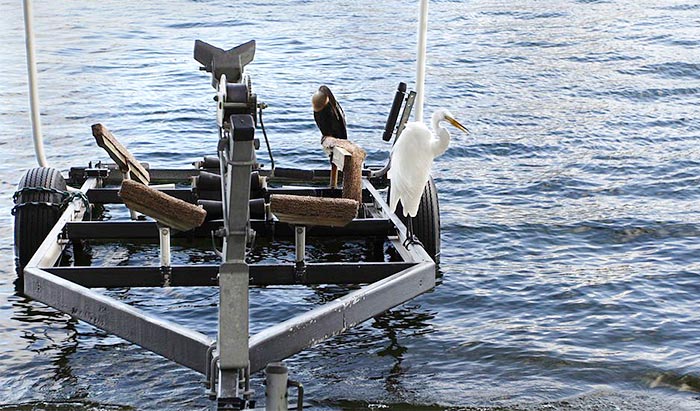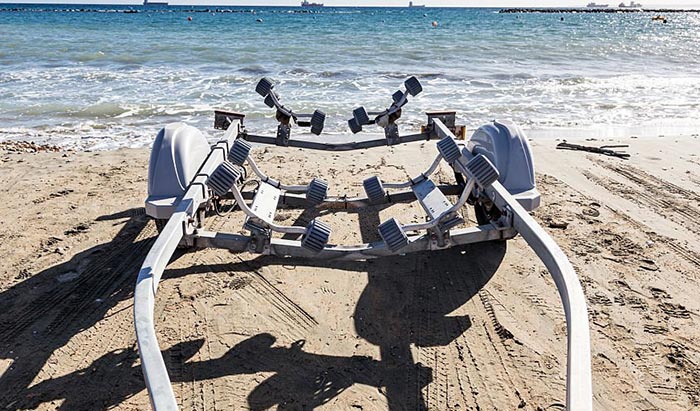Whenever you are in the market for a boat trailer, one of the biggest decisions you have to make is what material to choose for your trailer. While both Aluminum and steel have their benefits, there are some distinct differences that you should consider before making your decision.
In this blog post, we will compare the pros and cons of each, weighing if one is better than the other for certain purposes. Read on to know.
Contents
What is an Aluminum boat trailer?
An aluminum boat trailer is often made of high-quality Aluminum, with distinct features such as flexibility and lightness.
This metal-like material is used in the construction of aircraft and boats, as it can be melted, cast, machined, and formed into multiple shapes.
Furthermore, Aluminum is also corrosion-resistant, making it a good choice for boat trailers that will be exposed to saltwater.
What is a Steel boat trailer?
A steel boat trailer is indeed constructed using steel – an alloy of carbon and iron. Its distinct properties are strength and durability.
Steel is indeed a strong metal used for constructing buildings and bridges. Steel is also known for its heaviness, making it a good choice for boat trailers carrying large boats.
Which one to choose – An aluminum trailer or a steel boat trailer?
A few key factors distinguish between an aluminum or steel boat trailer. As we will compare below, the trailer’s weight, durability, and cost are the primary differences.
Weight – Aluminum is more lightweight
Aluminum trailers are typically much lighter than steel trailers, which means they are easier to tow and maneuver. This can be a big advantage if you plan on doing a lot of boating in areas with limited access.
In fact, an aluminum trailer can save fuel as it requires a less powerful tow truck. Therefore, it can also be more economical to move around.
Speed – Aluminum trailer is faster
Another consideration is speed. Aluminum trailers are typically faster than steel trailers because they are lighter and have less friction. This can be a big advantage if you are going to be doing a lot of boating in busy areas near rivers or lakes.
Durability – A steel trailer is more durable
One advantage of steel trailers is that they’re generally more durable than aluminum trailers. Steel is less likely to be damaged by rocks, or other debris kicked up while driving.
Steel can withstand more weight without breaking or bending compared to aluminum. Also, steel trailers tend to hold up better in saltwater environments. If you’re planning on using your trailer in saltwater regularly, steel is the better option.
Maintenance and repair – Aluminum is more flexible for repairing
When it comes to maintenance, aluminum boat trailers require less upkeep than steel trailers. This is because aluminum does not rust as steel does. So, if you live in an area with a lot of saltwater or humidity, an aluminum trailer may be the better option for you.
Besides, aluminum is quite flexible, thus allowing welding and remodeling without much effort. Meanwhile, customizing steel or fixing the broken part requires a mold and a complicated repairing process, thus costing users more than fixing aluminum.
Cost – Steel trailers are less expensive
Cost is always a consideration when making any purchase, and boat trailers are no different. Steel boat trailers are typically less expensive than all-aluminum trailers.
However, you should keep in mind that steel trailers will cost more if maintenance or customization is necessary.
Conclusion
Both aluminum and steel boat trailers have their pros and cons, but ultimately it comes down to what you are most comfortable with. Aluminum boat trailers are a great option for those who want a lightweight trailer that is easy to tow behind them.
Steel boat trailers are more durable and can withstand more wear and tear, making them a good option for those who frequently use their trailer.
Ultimately, the decision of which type of trailer to purchase comes down to personal preference and what will work best for your needs. Have you decided if an aluminum or steel boat trailer is right for you?


